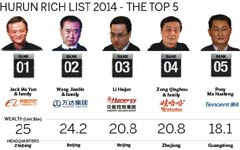"How large the new Internet economy will become and how it will do it is hard to gauge. It is very likely that new players will arrive on the scene and disrupt the economy again, much like what Jack Ma did with Alibaba."
One of the biggest challenges for China's Internet companies is the sheer speed with which the business is changing, he says.
"That means it is extremely difficult to build an enduring company on the Internet."
Adam Xu, a partner who leads strategy and digital and consumer practice with management consulting firm Strategy&, a member of the PricewaterhouseCoopers network of companies, says the increasing pace of change includes potentially disruptive competitors entering the fray, which means competition from outside the sector.
 |
 |
"In today's Internet world, the so-called competitive advantages or moats are increasing and are becoming more fragile. So Alibaba, Baidu and Tencent will always need to be on top of technology trends and disruptive forces, and will need to take preemptive measures to hedge the risks."
However, Chiang of the Shanghai-based CEIBS has a different take. New Chinese billionaires will appear, but it is unlikely they will rank above Jack Ma, Robin Li or Pony Ma in the foreseeable future, he says.
The huge scale of Alibaba, Baidu and Tencent combined took years to build, and today's operating environment is not the same as it was in those days.
"So it's unlikely any newcomers will achieve the level of success that they did. As to billionaires from other sectors in the near future, the health sector might have a chance because healthcare is a necessity for every Chinese, young or old. A dominant player in this field may achieve the same results as Alibaba, Baidu and Tencent or even better them."
Chiang says the top challenge for the increasingly rich Internet business giants is to avoid becoming too big for their own good like a government bureaucracy or some other rigid institution.
"The entrepreneurial spirit and the ability to be fast-moving and quick to adapt to customers' needs are the two most important ingredients of their success. They cannot afford to lose that."
Talent is also a vital component, Chiang says. Recruiting and retaining top talent is the key to ensuring smooth succession and driving prosperity.
Until quite recently China's domestic Internet companies have not been seen as top choices for jobseekers compared with stable positions with State-owned enterprises and high-paid multinational companies, but their reputations have improved.
Shi Jing contributed to this story.
